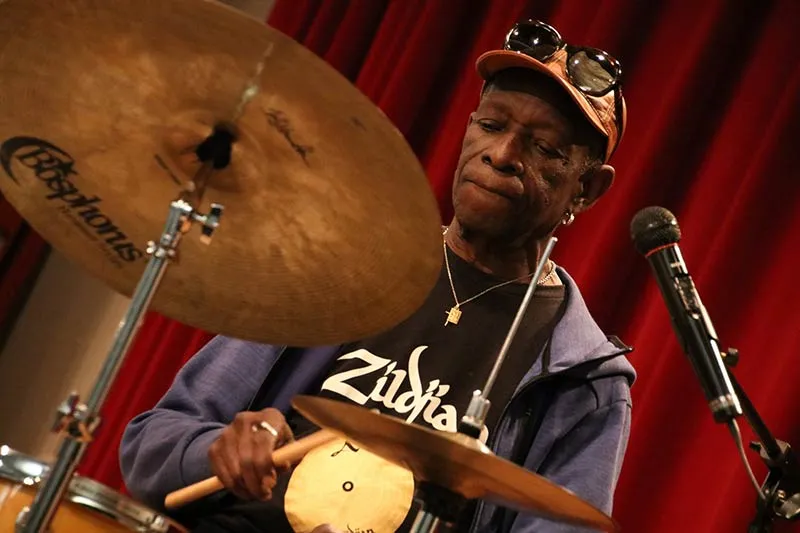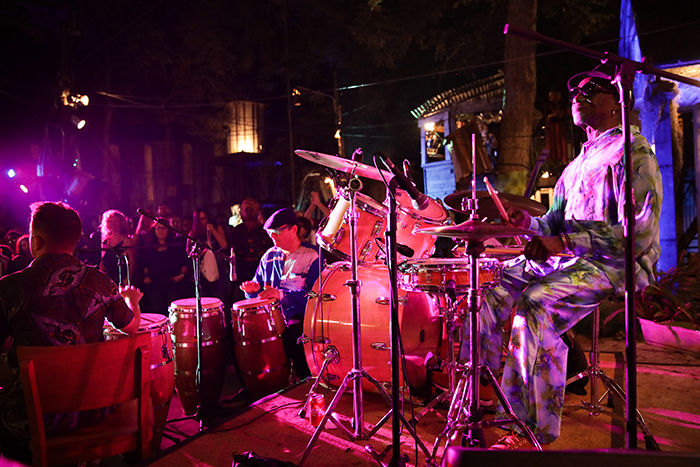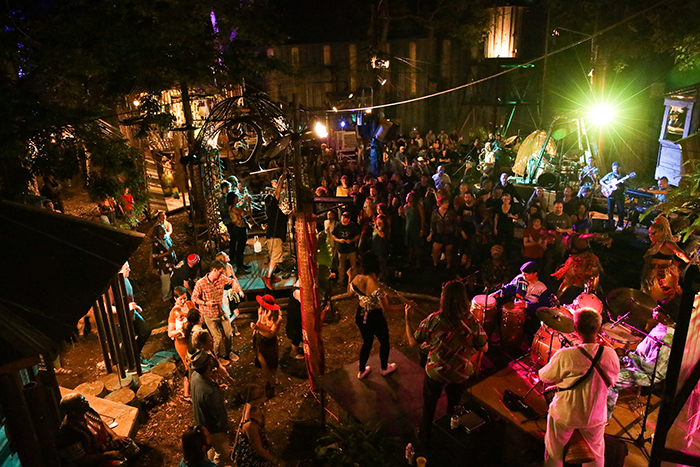
It’s not everyday that one has the opportunity to learn from an internationally acclaimed musician. This fall, Nigerian musician Tony Allen visited Tulane to host a masterclass after performing at the Music Box Village, a project of New Orleans Airlift in the city’s ninth ward.
Allen is most known for his style of drumming that has informed the way people create music around the world. Beginning in the 1960s, Allen was the drummer for Fela Kuti’s bands, creating music that was steeped in African heritage and political frustration, and combined jazz, West African beats, funk, and soul. A genre known as Afrobeat soon emerged from these sounds. Allen has collaborated with many musicians since, such as Brian Eno, the Red Hot Chili Peppers, and Damon Albarn of the Gorillaz, while continuing to create his own work.
On a sunny October afternoon, professor Daniel Sharp of the Newcomb Department of Music led a question and answer session with Allen, and as he responded, Allen offered demonstrations on a drum set. As the end of the master class neared, Allen invited drummers on stage to teach them specific rhythms—educating drummers is something Allen is incredibly passionate about. After the presentation concluded, I sat down with Allen to ask a few questions about his inspiration, collaborations, and the power of music.
Emily: You’re in New Orleans for a few performances at the Music Box Village—can you tell me a little about performing there?
Tony: Last February I performed there for the first time. Kumasi, a local Afrobeat band, asked me to play with them at the space, so I did two shows with them. There’s nowhere else like the Music Box—photographs can’t capture it, videos can’t capture it, you just have to go.
Emily: And you performed with them again last weekend?
Tony: Yes. And this time, eight months later, I was collaborating with different musicians, not Kumasi alone. I was playing with drummers from Congo Square, Luther Gray, and musicians from Preservation Hall.
Emily: It sounds like you enjoy collaborating.
Tony: I love it. Collaborating—it’s my kicks. All I know is that it broadens your knowledge, mingling with other people’s minds, and fusing them together to be positive.
Emily: I loved your response in the masterclass when Daniel Sharp asked you what makes a good collaboration. You mentioned it’s something you feel. That it really brings out intuition when you play, because there’s not a formula for it.
Tony: Yes. It’s about the feel of it. You have to be flexible.
Emily: In the masterclass today, you took questions and demonstrated for the students. What do you hope students most gained from hearing you today?
Tony: I love to do the masterclass for drummers. I love to extend their knowledge. Even if they cannot do the drum exercise immediately, they have it in their mind after the demonstration. And then if they have studios, they’ll go back on their drums and start practicing the exercise. It stays with them.
Emily: We touched on intuition in a previous question—when you perform in different cities, does it feel different, does it affect the way you play?
Tony: For sure. Every city has its own vibes. Natural and spiritual vibes. You know what I mean? And it’s good for one to catch that, because you don’t always have such an environment.
And I love New Orleans. It’s tropical. It looks like where I’m coming from.
Emily: What continues to inspire your work and music?
Tony: Right now for instance, I’m not doing anything of my own. I’m collaborating. There’s a lot in front of me right now to accomplish, but I love collaborating because it’s a continuation of exploring.
When I’m ready for my own stuff, even then, I’m not making too much of a clean album of my own. I like to have guests so I’m not just listening to myself. It’s like when I invited Damon Albarn to sing on an album—he had never sung on Afrobeat music—but I invited him, kind of like a challenge to him. And he did it, and he did it fine.
Emily: How do you think music—playing music, studying music, writing about music—influences the way we see the world around us?
Tony: It depends. Some people, when they play music, they are just singing about love. It depends on what message you want your music to have. Music is there and you can use it, you know. And it’s even better, it’s powerful, because it spreads quickly.



